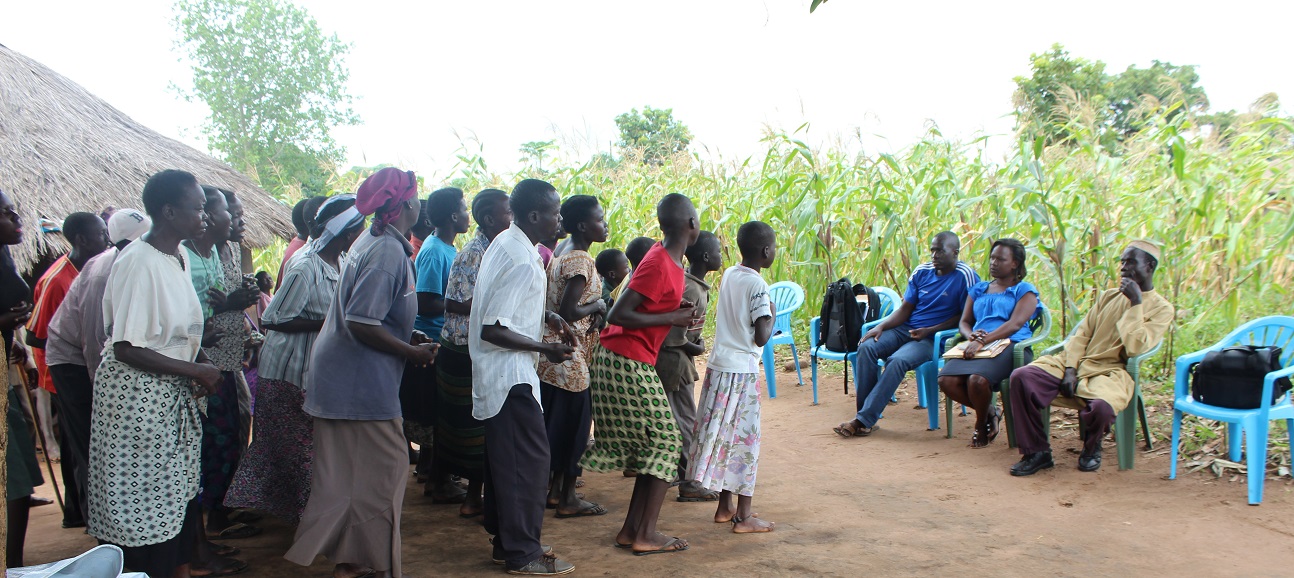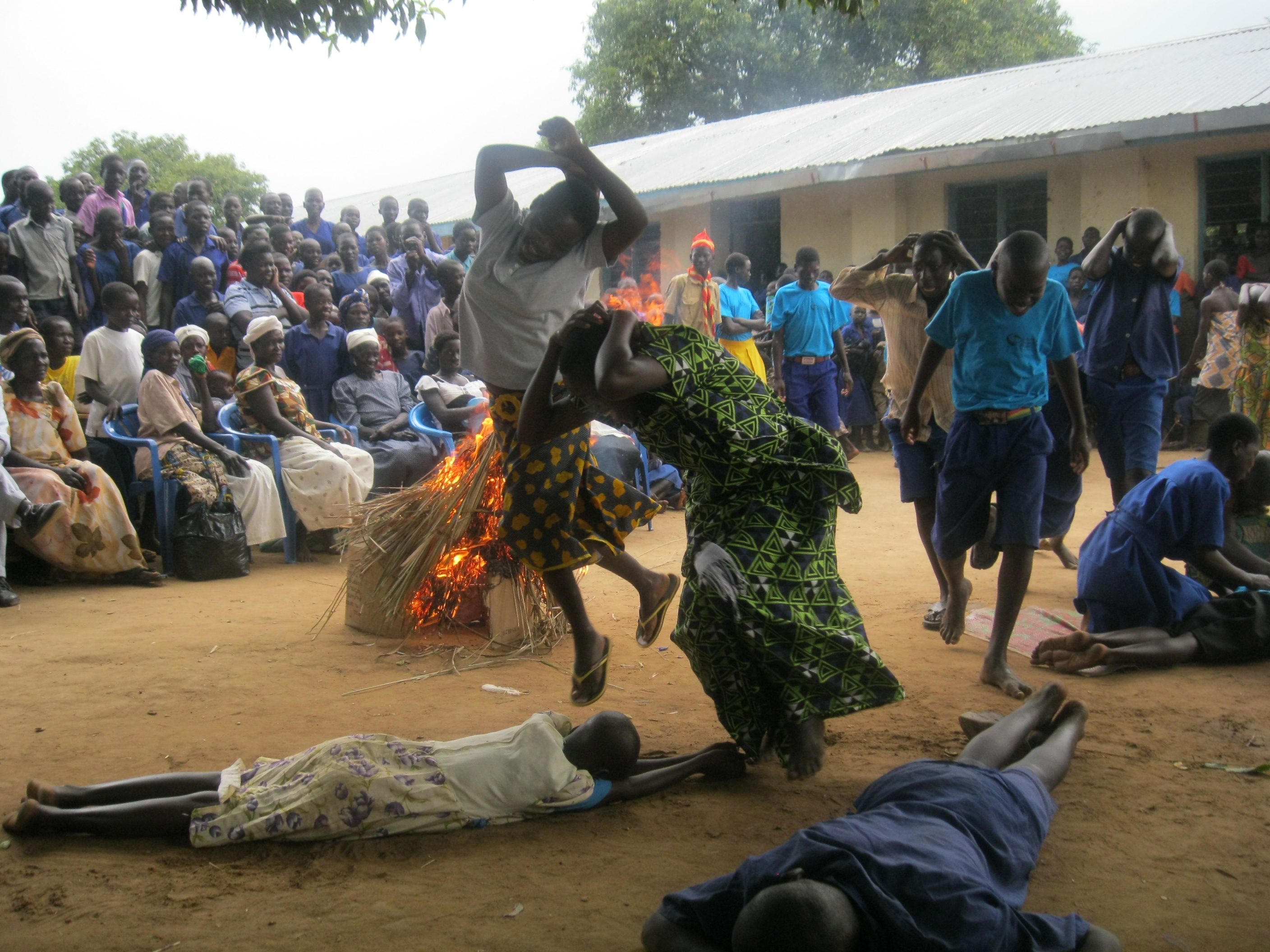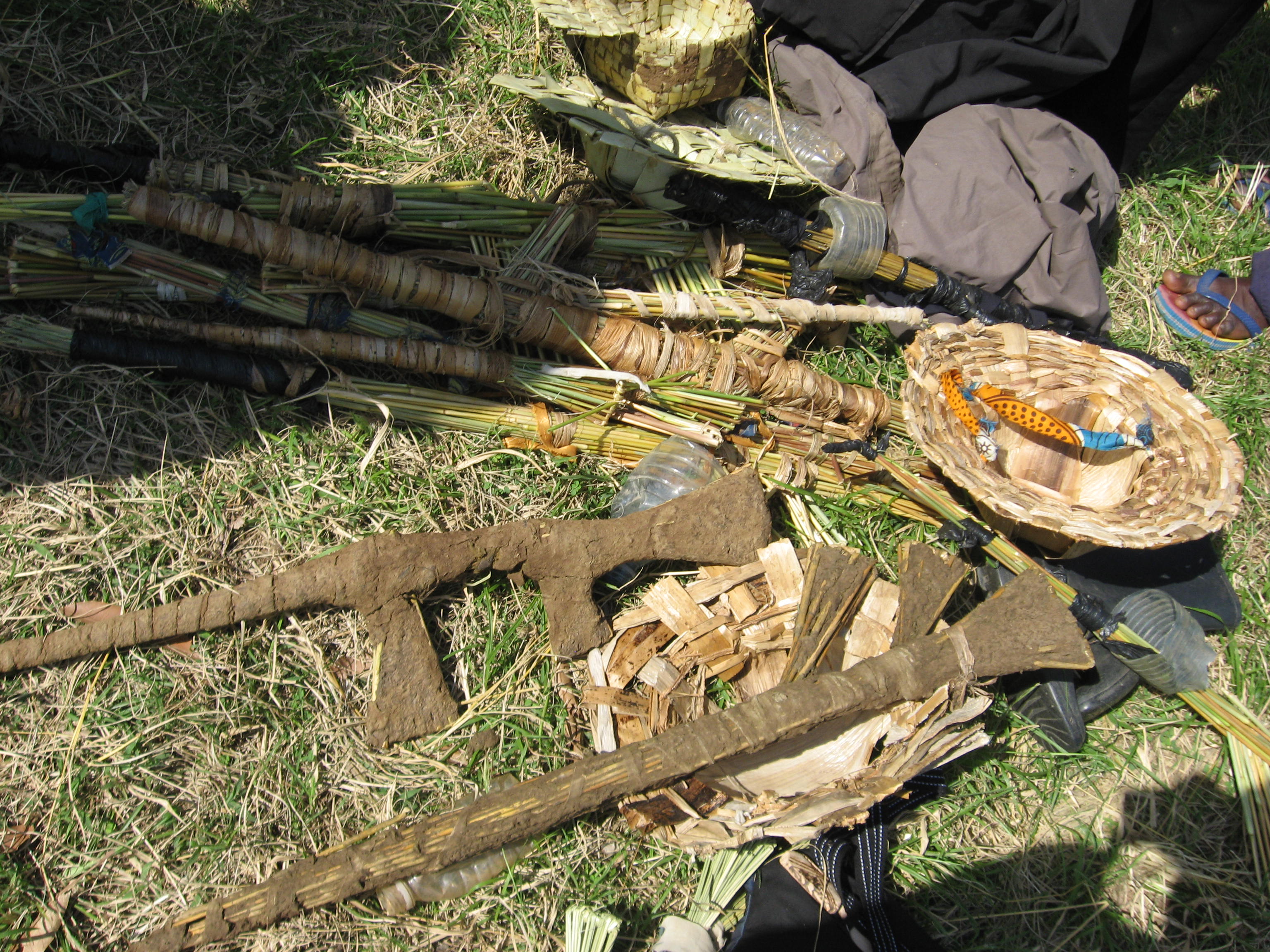
The journey to Nomakora sub-county is difficult. One must first drive from Gulu towards Kitgum and from Kitgum veer off tarmac and on to red dirt roads. Rains have not come this year, and the dust seems to predict another sort of storm. Vehicles kick up enough of it to obscure everything. Dust leaves a fine film on the skin. It comes into the nose. It makes lungs feel dirty.
Justice and Reconciliation Project staff traveled to Nomakora last week, in order facilitate a community outreach program. Women’s Advocacy Network group members designed a theatre piece in order to teach their neighbors about the horrors of abduction and life in the bush. The goal was to reduce stigma within the community, by showing both the difficulty of the past and the promise of future reconciliation. The program also helps to empower women previously silenced, and gives them a powerful platform and voice. JRP has a history of facilitating similar community theatre programs, with great success.
The afternoon sun blazed and women sat in the shade, away from the dusty road. They made props, weaving tiny AK47s from stiff grass. Children picked at the false weapons, eager for new toys. Babies nursed. A DJ arrived to set up a sound system for the program, and community leaders and other villagers arrived as well, settling into wooden chairs or simply sitting on the ground.
Before the play came a prayer for those still in the grip of the Lord’s Resistance Army. According to the LRA Crisis Tracker, sponsored and created by Invisible Children, the rebels have been active in the Central African Republic and Democratic Republic of Congo as recently as September of this year, with an attack near Yalinga, DRC. A number of children remain in captivity.
This prayer complete, a woman named Evelyn asked the community for peace. Her voice soft and earnest she said, “If you have killed everyone, who will help us? Who will be the next generation?”
The drama itself began with a portrait of daily life in the shadow of violence. Children supposed to help their mother cook begged to play outside instead. Then, without warning, they were snatched from their homes and taken to the bush. The actors mimed beatings and battles and being forced to carry guns and heavy loads.
It was not difficult to image the same scene playing out here and nearby, in the surrounding villages, and along the porous parts of maps. It was not difficult to imagine also those traumas not portrayed; to imagine the forced marriage of young girls, offered up like objects to senior commanders.

At last, the story came to its cautiously hopeful conclusion. Those children once supposed to help cook, returned home and to their mother. She cried out in joy and gripped them to her, but the children were too tired to speak about their experiences. “Let us rest,” they said. Family reunions were haunted by other ghosts.
While it ended with a reunion, the play made clear that a new set of challenges lay ahead. The formerly abducted face daily discrimination. Unable to finish school, they lack job skills, making it difficult to support themselves and their families. Many are victims of domestic abuse.
One woman, identified as Jennifer, spoke directly about this violence. The program had ended and the sun was setting fiercely. We had stepped away from the crowd. Jennifer said, “Whenever [our husbands] go on a drinking spree they take that opportunity to insult us, stigmatize us and abuse us.” Her comments implied alcoholism and a lack of security, even within the home.
The war is over in Uganda, but many obstacles remain.

As a result of the drama, local and cultural leaders and community members have become increasingly aware of the hurdles returnees must surmount. District officials are eager to ameliorate the situation. Following the drama, many made passionate speeches.
Counselor Five Nomakora Sub-County, Kenneth Nyero, seemed particularly eager to aid the formerly abducted. He was deeply moved by the program. Following his speech, we talked in more depth. The DJ had begun to play by then, and music echoed over the conversation.
Mr. Nyero hopes that the government and non-profit organizations can form long term partnerships in order to support vulnerable people, and specifically those returned from captivity. “We will work together as a team supporting humanity,” he said. “We have to support the ones who have come from the bush . . . the government does not have a specific program targeting [returnees]. If possible, there is need to design a specific program that will target these groups.”
Community members were also touched by the program. An older woman, called Anette, claimed that piece truly showed what happened in Namokora. Her tone implied memories awakened and a sense of watching history on repeat. Her daughter was abducted during the insurgency, but has now returned, even serving as secretary for the WAN group in Namokora.
Anette spoke little about her own experiences and past, focusing instead on the future. During the play she observed community members crying, overwhelmed by the intensity of it all. She hopes this is a sign of change to come. “There is going to be great impact for those who have the feelings,” she said.
The drama and speeches complete, Namokora returned to its normal rhythms. Children turned summersaults in the grass. Others rushed back down the road with yellow water jugs, trying to reach home before dark. The chairs were brought back. Women took advantage of the DJ and danced wildly.
Life went on.

The drama program in Nomakora is a microcosm; one aspect of a much larger initative. Following, JRP staff visited Lapono and Adjumani, where community theatre performances also took place. Women in Lapono shared stories of alcoholism and domestic abuse, presenting possible situations for redress through continued dialogue and active leadership. Performers in Adjumani reenacted battles, while leaders called for more services, overwhelmed by the ongoing transitional justice process and South Sudanese refugee crisis simultaneously. Meanwhile, women in Soroti staged a radio program about stigmatization.

According to Community Development Officer Lapono Sub-County, Bena Sarah Ongom, there is profound desire to share these dramas more widely, in order to increase their impact. “Clearly the play is based on a true picture of the community. Whatever challenges they gave in the role play, is the actual truth on the ground. I think from the good practices they picked from the drama they can be in position to improve, especially against gender based violence and how they can overcome it. We advise that this kind of play should be expanded to most of the parishes,” she said.
Community dramas speak to the fortitude of returnees and to the strength it takes to rise up and teach others, no matter how exhausting or difficult the task. They speak to the capacity for learning and forgiveness, and to the possibility of complete reconciliation within the community. They also speak to the vast scale of the problem and to the clear need for continued support; for more support. Many returnees have not been able to form non-profit supported groups, and so cannot take part in programs such as these. Thus, the performers represent a fraction of the voices and stories within the northern region.
JRP will remain invested in these communities through community theatre programs and other means, and continue to amplify marginalized voices and foster reconciliation. Information gathered will also aid the development of a best practices guide of other non-profits working with survivors of sexual and gender-based violence, ultimately expanding JRP’s reach.









